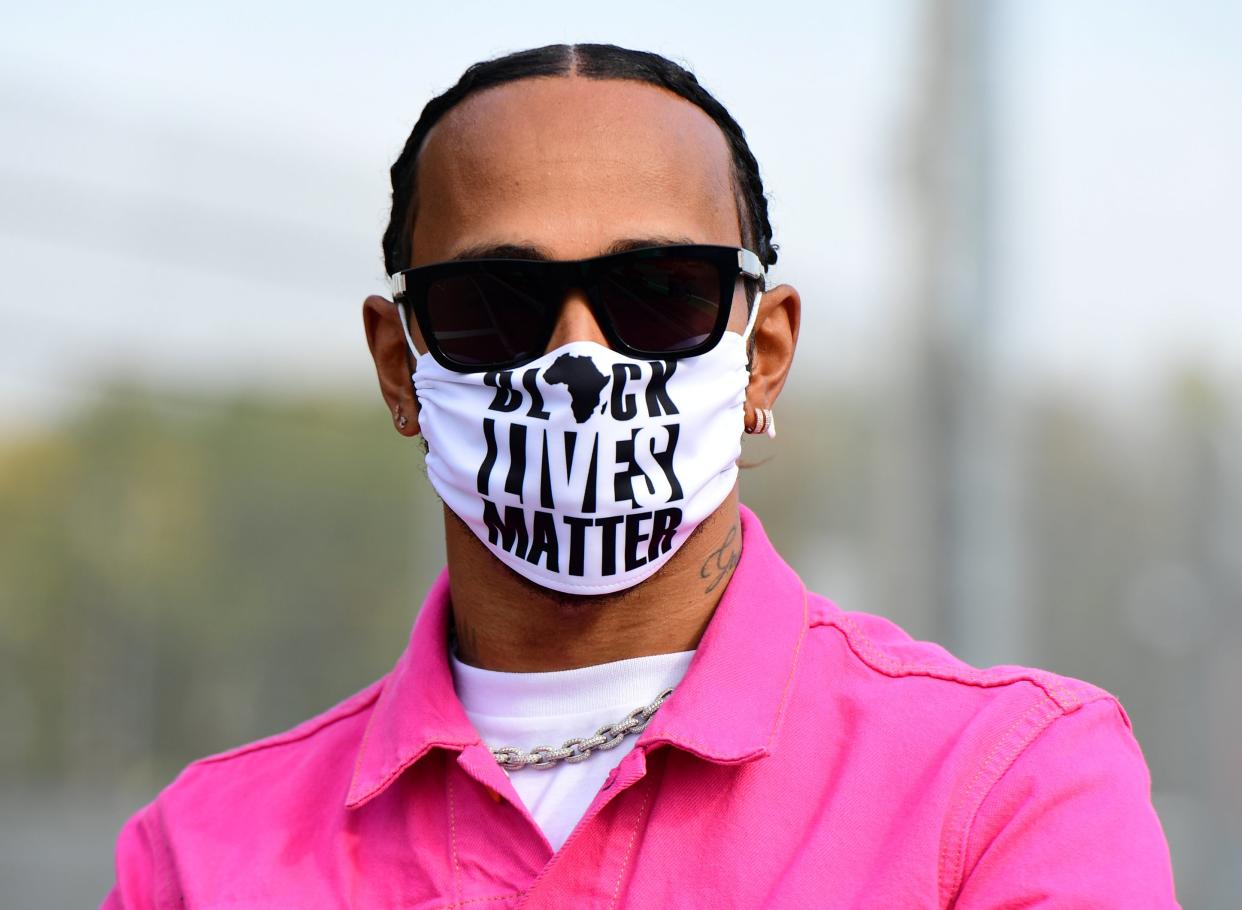Lewis Hamilton admits records will mean nothing to him if he doesn’t help inspire change within F1

Lewis Hamilton has said that his 92 Formula One victories and numerous word titles will mean nothing to him if he doesn’t help to change the way the sport reflects race and diversity as he closes in on a record seventh world championship.
Hamilton surpassed Michael Schumacher’s record for the most wins in F1 last weekend in Portugal, and can equal the German’s haul of seven world titles as early as the Turkish Grand Prix on 15 November that will see him draw level with the record for the most world championships in history.
But his record-breaking year has coincided with his push for greater diversity and racial equality in Formula One, with the creation of the Hamilton Commission that will aim to help open up doors to young people of Black, Asian and Minority Ethinic backgrounds within motorsport. Hamilton has also taken on a proactive approach to trying to combat racism by using his platform to promote the Black Lives Matter movement, and he has also worn T-shirts during race weekends in relation to the killing of Breonna Taylor by American police officers and last week showed his support for the Ends SARS movement against police brutality in Nigeria.
Given the attention that has been given towards Hamilton beating Schumacher’s record, the Mercedes driver
“If I look in 20 years time, of course I want to know that I didn’t just waste my time collecting accolades and titles,” Hamilton said in an in-depth interview with Sky Sports presenter Mike Wedderburn to discuss the anti-racism movement within F1 this season.
“These titles have just never meant anything to me. It’s not been a target - of course winning the world championship is a good thing but it’s not been the most important thing to me.
“It’s continuing to go out there day-in, day-out and deliver the way I know I can deliver and living to my potential. But you want to look back and say I was a part of something much bigger than myself, than my team, than the sport, and I did it with a whole group of people and a lot of force against us, but also a lot of force because there was many of us pushing in the same right direction.”
The Hamilton Commission aims to bring about real change, with the 35-year-old admitting that there are a lot of similar schemes that ended up having little to no impact in what they set out to achieve.
Pushed on what he aims to do, Hamilton hopes that his Commission, which features a number of leading voices from politics, sport and education that are “much smarter” that he is, will look to give people the knowledge of how greater diversity can be achieved to help the sport reflect the world today - something that was highlighted by the fact that Wedderburn was only the second or third black person to interview Hamilton in his entire career in what remains a white male-dominated industry.

"What I notice is, it's not something you can just change over time. It's not about firing people and swapping them for people of colour - it's not about that. It's really understanding what the barriers are,” Hamilton explained.
"I've got an amazing group of people that are on this commission. Some are in politics, some are on the ground in black communities, some are in education. At the end of the day, it does come down to education. The goal is not to do something short-term, it's about setting something up and providing a recommendation for these different businesses, these companies that are here, in how they can go about improving the diversity within their own organisations.
"It has been great to see the response, particularly from Mercedes. I'm most impressed with (them) out of the whole sport. Naturally you can say that's because I'm there with them, and we've had very difficult conversations.
"Formula One also has said they're open to move forwards, but a lot of people don’t know how to do it, and that’s why I’ve got to do this research.
"The goal at the end is to have a more diverse sport that represents the outer world, which in my opinion it currently doesn't."
The six-time world champion is completely honest in his admission that he needs to learn more about the issue himself, having been the first among the Mercedes team to sign up for their compulsory diversity training earlier in the year.
"It's not like that I have not spoken about it before, the lack of diversity within my sport," he added. "But it's never been heard. No one has ever listened. No one has ever cared to do anything about it, do the research. And I thought me being here would be enough and hopefully inspire some kids coming up, but it is an expensive sport.
"But when I talk about diversity, I'm not talking about drivers. That's probably the last part of the end of the straw. It's all the other great jobs and opportunities there are here."
Read more
Norris sorry for ‘stupid and careless’ Hamilton and Stroll comments
What makes Hamilton and Schumacher so great – and who is the greatest?
Stewart leads tributes to Hamilton after breaking Schumacher’s record


